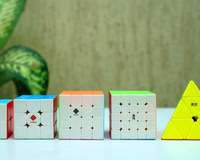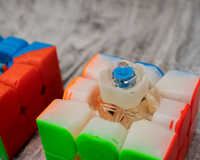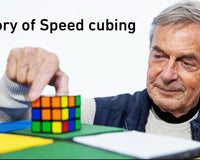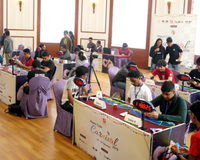When it comes to solving the Rubik's Cube, the CFOP method stands as one of the most popular and efficient approaches. CFOP, an acronym for Cross, F2L (First Two Layers), OLL (Orientation of the Last Layer), and PLL (Permutation of the Last Layer), offers an advanced way to solve the cube in a minimal amount of time. Among the four stages, F2L tends to be the most challenging and time-consuming for beginners. However, despite the initial increase in solving time, mastering F2L can significantly improve solving speed in the long run. In this blog, we will explore why F2L initially increases solving time and how it eventually becomes a crucial stepping stone for speedsolvers.
Understanding F2L

First Two Layers (F2L)
Before diving into the discussion, let's clarify what F2L entails. F2L involves solving the first two layers of Rubik's Cube simultaneously. Instead of solving each layer individually, F2L combines the steps of inserting the corners and inserting their respective edges. By doing so, it minimizes the number of moves required and allows for faster solves.
Initial Hurdles and Increased Time

For beginners, F2L can be pretty daunting. It introduces new concepts and techniques that require time and practice to grasp. Initially, F2L tends to increase solving time due to several reasons:
- Increased Complexity: F2L requires the solver to think in terms of “pairs” of corner and edge pieces, rather than focusing solely on the corner pieces, and then the edge pieces after that. This added complexity can be overwhelming at first, leading to slower solves.
- Recognition and Planning: Identifying the F2L pairs and planning the moves to insert them correctly demand a higher level of understanding of the Rubik’s cube and a lot of practice with the F2L method. This skill takes time to develop and can slow down beginners in the initial stages.
The Turning Point
While it may seem discouraging at first, with practice, solvers gradually overcome the initial hurdles of F2L. As they become more familiar with the concepts, recognition improves, and planning becomes more intuitive. Here's why F2L becomes a game-changer in the long run:
- Fewer Moves: By solving the first two layers simultaneously, F2L significantly reduces the number of moves required compared to solving each layer separately. This optimization ultimately leads to faster solves.
- Understanding the Rubik’s cube: The F2L method can be done completely intuitively. This helps gain a better understanding of the Rubik’s cube and how it actually works.
Tips for Improving F2L Performance

Fingertricks
To make the learning process smoother and shorten the time it takes to start seeing the benefits of F2L, consider the following tips:
- Practice Finger Tricks: Efficient finger tricks can significantly reduce execution time. Focus on smooth and fluid movements to minimize pauses between moves.
- Solve F2L Pairs in Different Slots: To improve recognition and planning, practice solving F2L pairs in different slots. This helps develop a broader understanding of the various possibilities that you might face while actually doing a solve.
- Analyze and Learn from Solves: Regularly reviewing and analyzing your solves can provide valuable insights. Look for patterns, identify areas of improvement, and work on them to improve faster.
Watch: Beginners F2L Tutorial by @AryanChhabra | Hindi | Cubelelo
Conclusion
While it's true that F2L initially increases solving time for beginners, its long-term benefits make it an essential component of the CFOP method. By introducing efficiency and reducing the number of moves, F2L ultimately leads to faster solving times. The initial hurdles, such as increased complexity and execution difficulties, can be overcome with practice and dedication while mastering finger tricks and doing solve analyses. Happy cubing!
About Author

Sarthak Masta
Sarthak Masta is a speedcuber from Raipur. He started cubing in 2013 and now has 9 years of cubing experience. Apart from cubing, Sarthak enjoys making music and singing. He has attended a total of 7 competitions in Raipur and has gotten 10 podiums, with 2 gold medals, 4 silver medals and 4 bronze medals.
































